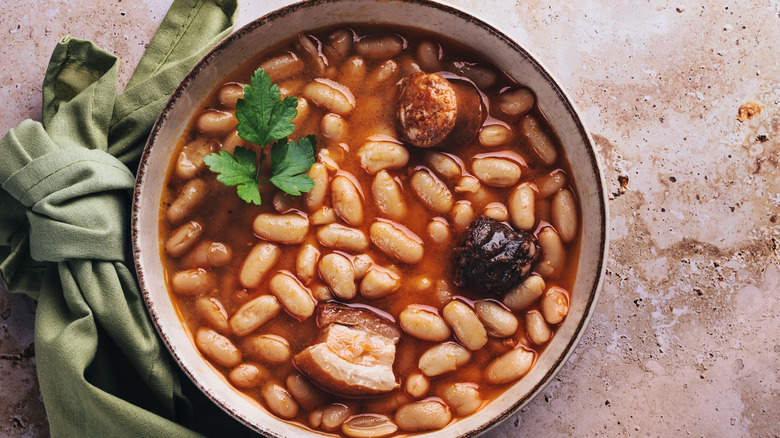The Healthiest Vegetables That Can Give You The Worst Gas
We may receive a commission on purchases made from links.
There's nothing quite like being able to pat yourself on the back after having a meal of some of the healthiest vegetables on the planet. You're not only impressed with the fact that you opted for the salad and/or grilled veggies instead of the pasta and cheese, but you're feeling energized and like you can take on the world. But while you're riding high on the fact that you made a responsible meal choice, you feel a grumble in your stomach. Then, before you know it, you need to pass gas.
Although farting is completely normal and healthy, some foods are more likely to induce it than others. For example, onions, cruciferous vegetables, beans, cabbage, broccoli, and legumes are at the top of the list of major flatulence-inducing culprits. The reason for this is the fact these foods are complex carbohydrates and chockfull of fiber and fructans. "Fiber is fermented by bacteria that's naturally present in our digestive systems," Registered Dietitian Nutritionist (RDN) at Top Nutrition Coaching, Lena Bakovic, exclusively told Health Digest. "[It's] through this process of fermentation that's the actual mechanism for potentially increased flatulence."
As Bakovic further explained, when you eat complex carbohydrates, it takes the gut longer to break these foods down and digest them, thereby increasing the fermentation process, as well as gas production. "Fermented foods, typically rich in probiotic content, provide beneficial gut bacteria," said Bakovic. "However, digestion of the fermented food products may also contribute to increased flatulence." What this means is you may want to skip the kimchi unless you know you'll be able to unleash your gas-filled intestines in the comfort and privacy of your own home.
How to prevent excessive gas when eating vegetables
Farting and needing to fart is a natural part of life. According to the National Institute of Diabetes and Digestive and Kidney Diseases, people pass gas roughly eight to 14 times a day, and up to 25 times a day can be the norm for some. But because gas can pop up when we really wish it wouldn't, resulting in not just potential awkwardness, but cramps and discomfort, it's completely reasonable why someone may want to prevent trapped gas.
One of the easiest ways to help eliminate gas, if you don't want to give up gassy foods, is by taking an over-the-counter alpha-galactosidase. While there are more than a few brand name versions (Beano is the most well-known), alpha-galactosidase breaks down the poly-saccharides and oligo-saccharides in the food you eat, getting things moving so as to minimize gas, per Thera Science. You can also try adding a bit of baking soda to any recipe that has beans or legumes. Baking soda breaks down the sugars that can cause gas. If you don't usually eat a lot of fiber, your gas could also be a result of not being used to it, so slowly increasing your fiber intake can help decrease gas. According to Harvard Medical School, the average U.S. adult only eats 10 to 15 grams of fiber per day, when it should be closer to 25 to 30 grams. So working more fiber into your diet might be exactly what you need to combat gas.
When excess gas might be a concern
For the most part, being gassy shouldn't freak you out because, if anything, it's a sign that your body is doing what it's supposed to do. You also just may have a penchant for eating kimchi, beans, garlic, broccoli, and other delicious treats, and, frankly, who can blame you? However, if you notice that you have the urge to fart more than usual and you can't link it to what you've eaten or how you've eaten it, then it's a good idea to give your doctor a call.
"Conditions such as irritable bowel syndrome (IBS) can include symptoms of excess flatulence," Bakovic told Health Digest. "Likewise, the presence of excess gas may indicate an imbalance between beneficial and non-beneficial bacteria naturally present in our digestive tracts." But only a healthcare professional will be able to determine if your gas is the result of these possibilities or something else. That's why it's always important to listen to your body and, in this case, smell its functions so you're aware of what's normal for you and what might need medical attention.


